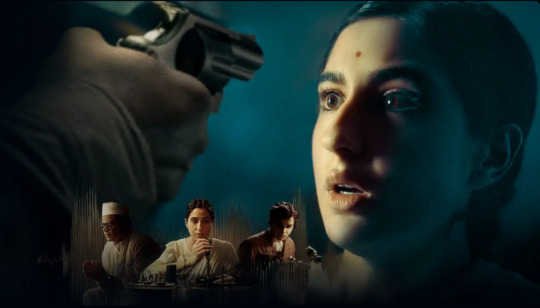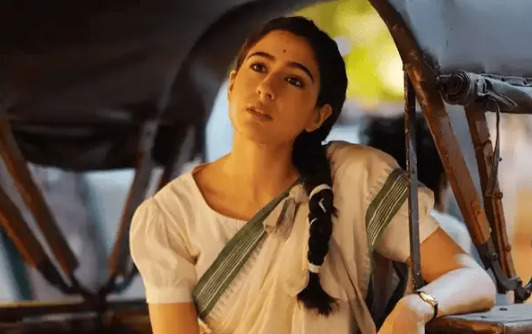#Ae Watan Mere Watan review
Explore tagged Tumblr posts
Text
Ae Watan Mere Watan - Sara's Frequency Falters in Radio Drama
⭐⭐⭐ Rating: 2.5 out of 5. Sneha Jaiswal (Twitter | Instagram) Director: Kannan Iyer Writer: Darab Farooqui, Kannan Iyer “This is the country’s radio calling on 42.34 meters (wavelength) from somewhere in India to somewhere in India.” The 2024 Bollywood movie “Ae Watan Mere Watan” is a historical drama set in the 1940s, celebrating the life of real-life freedom fighter Usha Mehta (Sara Ali…

View On WordPress
#Ae Watan Mere Watan#Ae Watan Mere Watan 2024 movie review#Ae Watan Mere Watan review#Entertainment#freedom fighters#freedom struggle movies#movie on congress radio#sara ali khan#Usha Mehta
0 notes
Text
Unveiling the Layers of "Ae Watan Mere Watan": Beyond its Cinematic Shortcomings
In the world of cinema, there are occasional gems that manage to shine through despite their apparent flaws. "Ae Watan Mere Watan" falls into this category, offering a narrative that transcends its lackluster execution to deliver powerful political messages. Let's delve into the depths of this film, exploring its portrayal of pressing issues such as press freedom, generational divides, and the struggle against ingrained conservatism.

At its core, "Ae Watan Mere Watan" serves as a tribute to the spirit of Usha Mehta, a pivotal figure in India's Independence movement. While the film may not excel in direction or performances, it boldly confronts the toxic propaganda prevalent in today's political landscape. Despite its shortcomings, the movie stands as a beacon of progressive thought amidst a sea of regressive narratives.
One of the film's strengths lies in its exploration of press freedom during authoritarian times. Inspired by Usha Mehta's involvement in founding the underground Congress Radio, the narrative sheds light on the importance of disseminating information in challenging political climates. In a world where media freedoms are increasingly under threat, "Ae Watan Mere Watan" serves as a timely reminder of the vital role journalists play in upholding democratic values.
Furthermore, the film delves into the theme of generational conflict, a topic that resonates with many viewers. Through Usha's strained relationship with her conservative father, the audience is confronted with the reality of youth rebelling against the ideologies of the older generation. Despite some stilted dialogue, the film manages to capture the essence of this struggle, presenting it as a timeless and relatable narrative.
Additionally, "Ae Watan Mere Watan" challenges blind faith and celebrates the role of women in the freedom struggle. By portraying Gandhi in a flattering light and highlighting Usha's resilience in a male-dominated society, the film breaks away from conventional narratives and offers a refreshing perspective on historical figures and events.
In a cinematic landscape often dominated by superficial narratives, "Ae Watan Mere Watan" dares to tackle complex themes with sincerity and depth. While it may not be without its flaws, the film succeeds in sparking conversations about the pressing issues facing society today.
In conclusion, "Ae Watan Mere Watan" may not be the most polished film, but its underlying messages are powerful and thought-provoking. As we reflect on its portrayal of press freedom, generational divides, and the fight against conservatism, we are reminded of the enduring relevance of cinema as a tool for social commentary and change.
0 notes
Text
Sky Force Music Review: Tanishk Bagchi’s Soulful Soundtrack of Love & Patriotism
🔥 Experience the musical magic of Sky Force! From the soul-stirring Maaye by B Praak to the patriotic Ae Mere Watan Ke Logon, Tanishk Bagchi delivers a powerful soundtrack. Don't miss this emotional ride of love, longing, and pride! 🎶🇮🇳 #SkyForce #MusicReview #TanishkBagchi #BPRaak #ArijitSingh #BollywoodMusic #NewSongs2024 #Saregama #PatrioticSongs #LoveAndMusic #AeMereWatanKeLogon
The music album of Sky Force brings together an evocative blend of patriotism, love, and nostalgia. With Tanishk Bagchi at the helm as the music director, the album beautifully balances contemporary soundscapes with traditional melodic richness. The lyrics, penned by some of Bollywood’s finest lyricists, add depth to each composition, making them not just songs but heartfelt experiences. 1.…
0 notes
Text
Ae Watan Mere Watan Trailer Review: The Wait Is Over...Sara's 'Ae Watan Mere Watan' Will Hit OTT
Bollywood actress Sara Ali Khan's upcoming film 'Ae Watan Mere Watan' has been making headlines. Now, the release date of this film has also been announced. Before this, the first look of the film was shared.
youtube
0 notes
Photo

New Post has been published on http://www.visionmp.com/raazi-movie-review-alia-bhatt-struggles-with-a-realistic/
Raazi Movie Review: Alia Bhatt Struggles With A Realistic Film
Cast: Alia Bhatt, Vicky Kaushal, Soni Razdan, Rajit Kapur
Director: Meghna Gulzar
Rating: 3 Stars (out of five)
The year is 1971. An Indian intelligence official lays out a scheme to send his daughter – an untrained college-girl – behind enemy lines to Pakistan, smuggling her in to sneak out wartime secrets. His colleague naturally finds the idea rummy, and is expressing objections when the officer’s wife insists they have dinner. “Khali pet iraade nahin bharte,” she says, “Hopes aren’t met on an empty stomach.” She leaves the room, and the colleague, hoping better sense will prevail from this articulate woman, asks his friend what she would rather do. “She’d rather you eat,” the officer smiles.
Coming from Meghna Gulzar – the director of Talvar, a fantastic film about a true-life murder case that was brave enough to take a stand – this delicacy isn’t surprising. Raazi, based on Harinder Sikka’s novel Calling Sehmat, is about the daughter of a spy strategically turned into the daughter-in-law of an opposing spy, and Gulzar keeps the storytelling cut and dry, draining the film of jingoism as she lets the young girl go about her work.
The problem lies with the young girl herself. The first time we meet this character, Sehmat, she runs onto the middle of the road to rescue an imperilled squirrel – cute-meat if not a meet-cute – and the film’s pitch changes immediately. Her father, normally restrained, starts speaking to her with overt exposition, suddenly parroting manipulative lines like a male Farida Jalal. “You know I work for the intelligence bureau,” he tells his daughter, for some reason. (“War? Phir se?” is her line right after). Raazi was meant to be a realistic thriller but, thanks to Sehmat, it keeps spiralling towards cinematic melodrama.
The film switches track every time Alia Bhatt, who plays Sehmat, appears on screen. Bhatt is an incendiary talent, but Raazi exposes how she overplays her hand. She is never bad here, but frequently does far more than needed, emoting for visibility rather than feeling. It is the kind of performance that may easily be mistaken for an impressive one – we do often treasure ‘Most Acting’ over ‘Best Acting,’ after all – but she is out of her depth, particularly because Gulzar surrounds the A-lister with a remarkably authentic ensemble. So we have a few solid beats, with officious gents opening files and discussing submarines, and then we have Sehmat, who suffixes every narrow escape with a hyperventilating shudder and moist-eyed shock – an indiscreet reaction that would be sure to raise an eyebrow. Bhatt has cornered the market on histrionics (and, indeed, hysterics) in this film.
The plot in itself is quite compelling, with fine parallels between a daughter-in-law winning over and fitting into her household contrasted with the reasons a spy would have for the same, but Raazi frequently makes itself hard to take seriously. For instance, despite her combat training, Sehmat can’t seem to negotiate the climbing of a high stool, and there is also the niggling detail that nobody in this Pakistani family, a family of army-men and decoders of intelligence, ever thinks to suspect the Indian girl in their midst. As a result, the film is competently crafted but never gripping. The stakes feel dramatic but unreal, and the film feels slow as a result. It certainly doesn’t earn its running time of two hours and twenty minutes. By the time the shrill climax comes around, dullness has set in.
Besides the intriguing bahu-spy premise, the film presents nothing new to inform the genre: spies have feelings, spies get sappy, spies cry. Even Bond films show us that these days. Gulzar does commendably depict how the other side is just like us – there is a rather clever use of the song Ae Watan, a patriotic track sung with equal fervour from both sides – but is the mere fact that this film does not thump its chest enough for applause?
Raazi does impress, though. The film has some finely phrased Urdu lines, and there is poetry to be found in the accidental belling of a cat and the savagery of a speed-bump. Rajit Kapur, Shishir Sharma, Asif Zakaria and Ashwath Bhatt are consistently solid with their matter-of-fact portrayals of country-loving men, Vicky Kaushal is believably vulnerable as Sehmat’s groom, and it is a treat to see Soni Razdan back on screen, albeit in a tiny role.
The film is centred, however, by the spymaster. As the operative who trains Sehmat, Jaideep Ahlawat is exceptional, creating a character who is steely and unflinching while also one whose heart is never in doubt. A superb, delicately poised performance.
With her innocent face and her round cheeks – that bounce with the recoil of the gun she fires – Bhatt really looks the part of the naive little operative, which is what makes it heart-breaking that she can’t pull it off as well as she should. There is the constant sense of self-consciousness to her performance, making Sehmat seem like a girl playacting as a spy instead of an actual spy. That might clear the average bar for a mainstream Hindi film, but Gulzar and Bhatt deserve to be held to a higher standard. It’s not enough to be Tinker Tailor Soldier Child.
0 notes